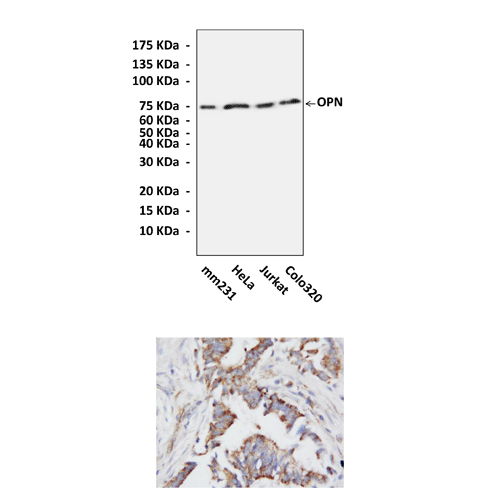Anti-OPN: Rabbit OPN Antibody
Rabbit OPN Antibody: Rabbit OPN Antibody
Size: 100 ul
Price: $302.00
Description
OPN was initially identified in osteoblasts as a mineralization-modulatory matrix protein. Now OPN has been studied as a multifunctional protein that is upregulated in a variety of acute and chronic inflammatory conditions, such as wound healing, fibrosis, autoimmune disease, and atherosclerosis. OPN is highly expressed at sites with atherosclerotic plaques, especially those associated with macrophages and foam cells. In the context of atherosclerosis, OPN is generally regarded as a proinflammatory and proatherogenic molecule. However, the role of OPN in vascular calcification (VC), which is closely related to chronic and active inflammation, is that of a negative regulator because it is an inhibitor of calcification and an active inducer of decalcification. In addition to being produced by cells of osteoblastic lineage, OPN has been shown to play important roles in chemotaxis, adhesion, and proliferation, all of which allow it to mediate inflammation and immunity to infectious diseases. For example, granulomatous responses are associated with high levels of OPN expression and OPN can function as a Th1 cell cytokine, enhancing IL-12 while inhibiting expression of the Th2 cell cytokine IL-10. Furthermore, OPN can alter the sensitivity of hematopoietic cells to other cytokine stimuli.4
2. Scatena, M. et al: Arterioscler Thromb Vasc Biol. 27:2302-9, 2007
3. Behera, R. et al: Carcinogen. 31:192-200, 2010
4. Cho, H.J. et al: Curr Atheroscler Rep. 11:206-13, 2009
Details
| Cat.No.: | CA1431 |
| Antigen: | A short peptide from human OPN carboxyl-terminal sequence. |
| Isotype: | Rabbit IgG |
| Species & predicted species cross- reactivity ( ): | Human, Rabbit |
| Applications & Suggested starting dilutions:* | WB 1:500 – 1:1000 IP n/d IHC 1:50 – 1:100 ICC n/d FACS n/d |
| Predicted Molecular Weight of protein: | 75 kDa |
| Specificity/Sensitivity: | Detects endogenous OPN proteins without cross-reactivity with other family members. |
| Storage: | Store at -20°C, 4°C for frequent use. Avoid repeated freeze-thaw cycles. |
*Optimal working dilutions must be determined by end user.
